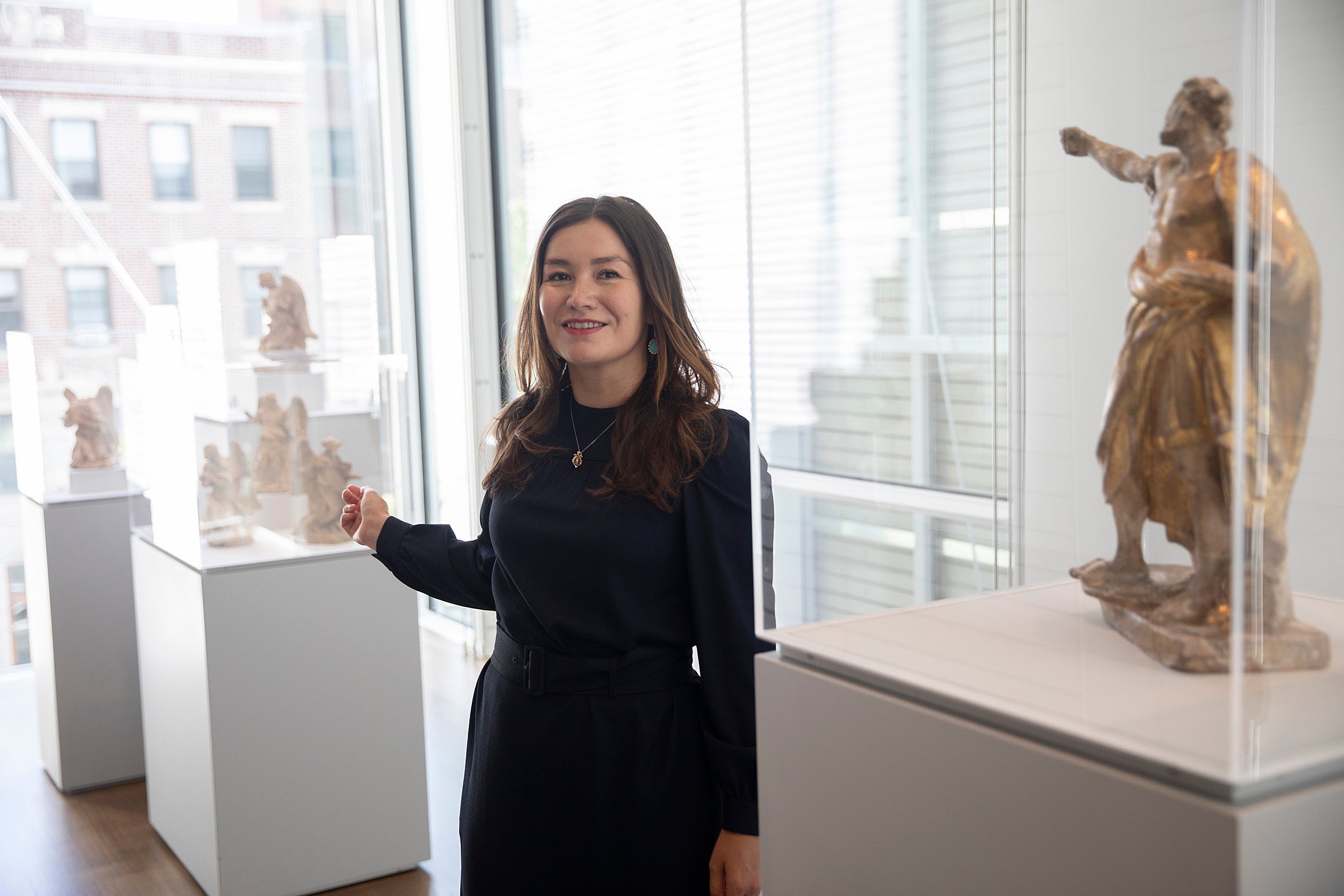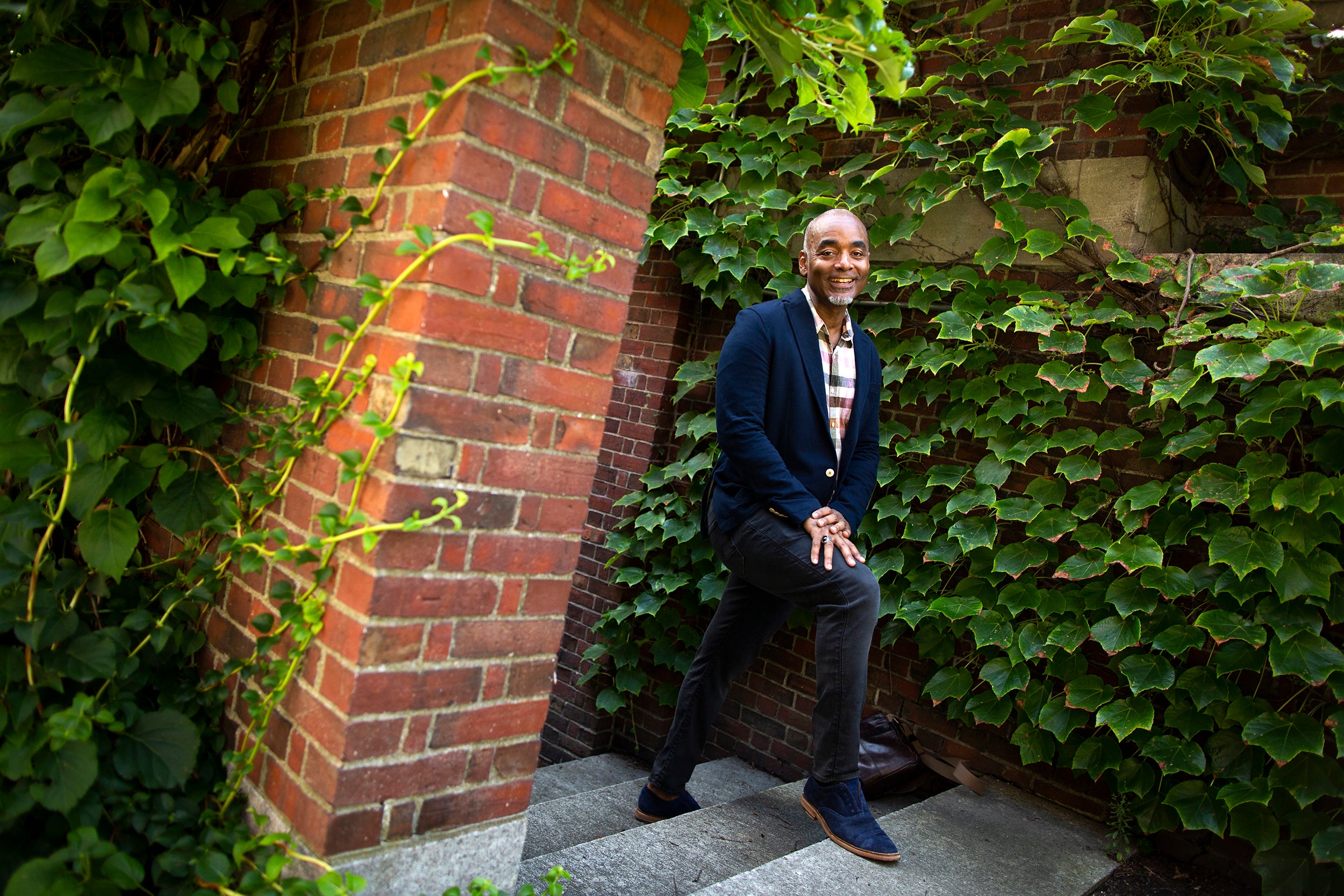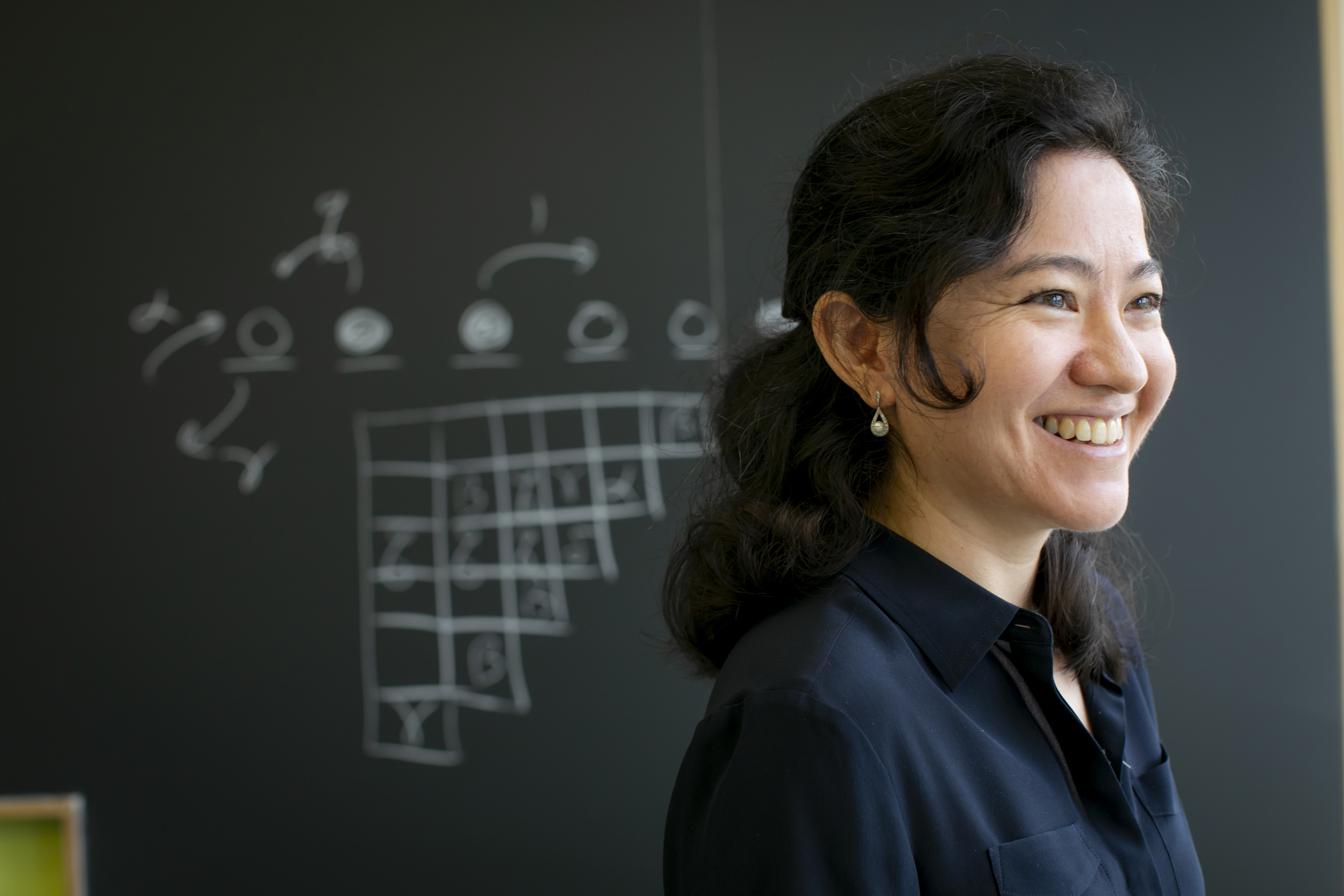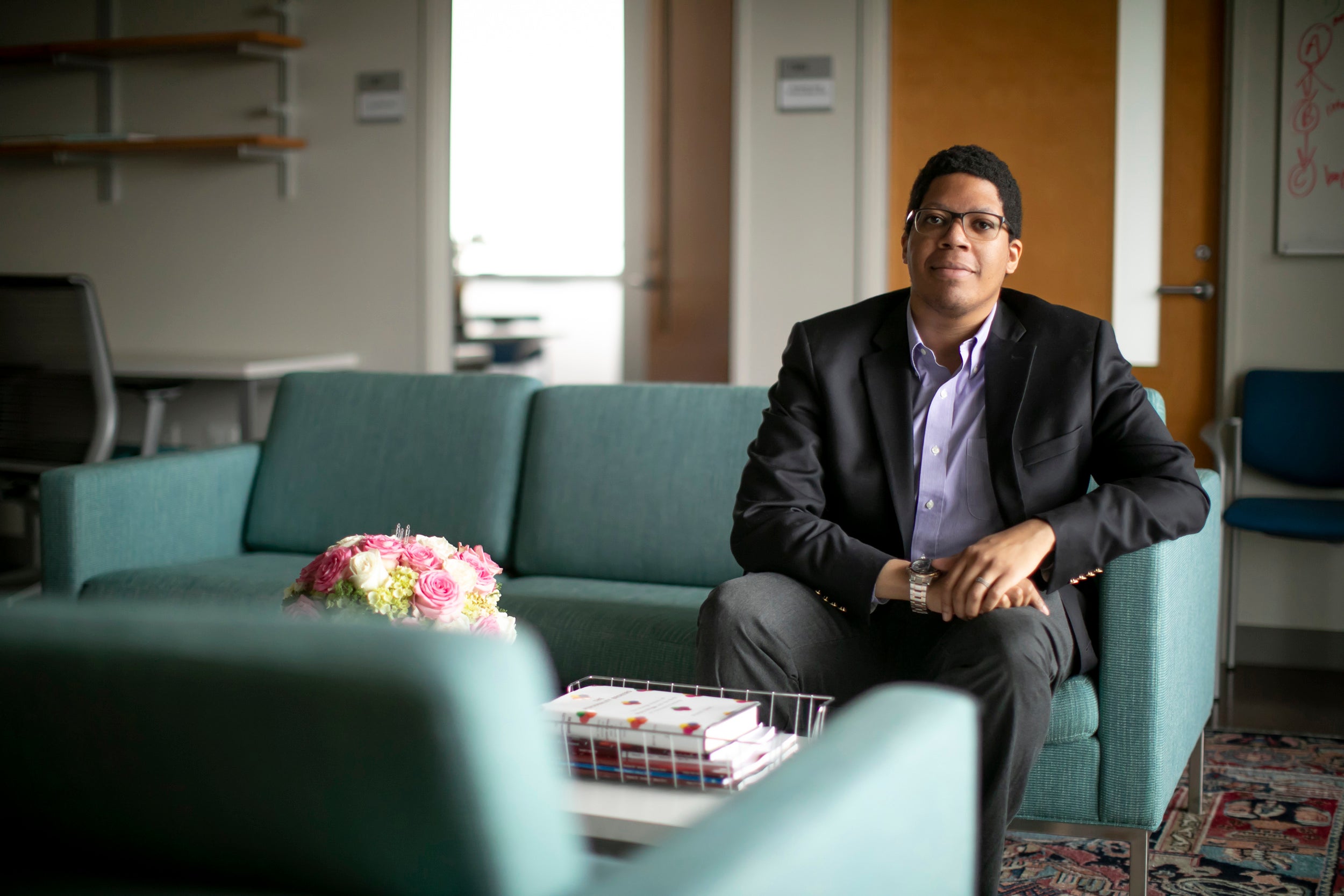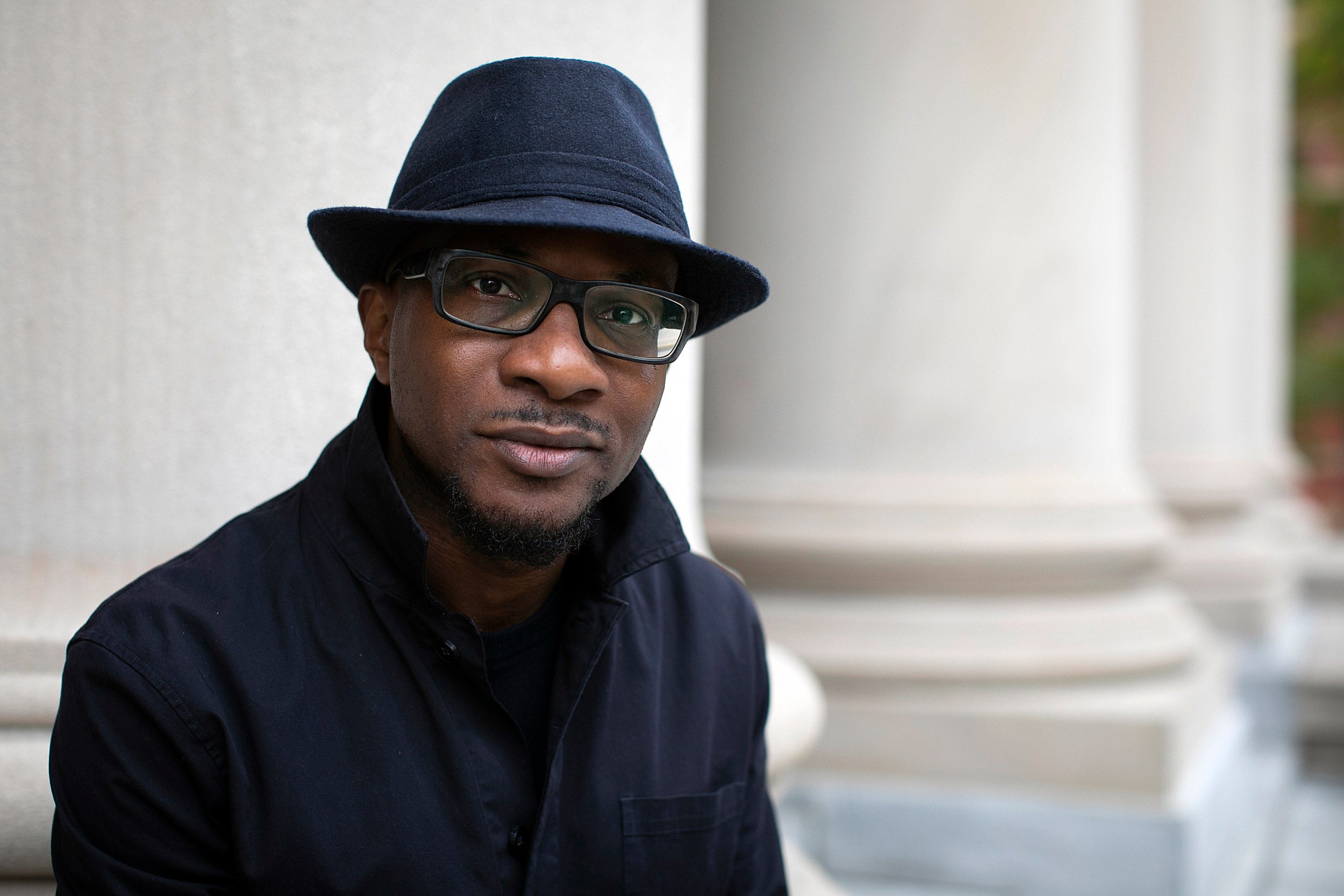
“Writing, language, and thinking are continuous for me,” says Teju Cole, Harvard’s first Gore Vidal Professor of the Practice.
Stephanie Mitchell/Harvard Staff Photographer
New faculty: Teju Cole
‘Open City’ author will urge creative-writing students beyond genre limits
Novelist, critic, and essayist Teju Cole will teach creative writing courses in the spring as the first Gore Vidal Professor of the Practice. The boundary-crossing author is known for his debut novel “Open City,” among other works. (Early admirers of the 2011 book included Harvard professor and New Yorker critic James Wood.) Cole received the PEN/Hemingway Award in 2011, the Windham Campbell Prize for Fiction in 2015, and a 2018 Guggenheim Fellowship. A photographer who has had solo exhibitions in the U.S. and Europe, he is also the photography critic for The New York Times Magazine.
Q&A
Teju Cole
GAZETTE: Welcome to Harvard. What form will your teaching take here?
COLE: Writing, language, and thinking are continuous for me, if not necessarily coterminous. In my published work, I try to break down the distinctions between them, and I do the same in my teaching. Writing is language-work, writing is thinking, and language-work is thinking. I’m going to teach two writing courses in the spring: “Writing Critically” and “Breaking Form.”
The critical-writing course asks: How do we respond to the arts in writing? There’s a fair bit of art history in my background, and photo criticism is my métier, but I’ve also done some poetry, film, and music criticism, and I want to bring those experiences into the classroom. What does it mean to approach a work of art and say something illuminating and intelligent about it? This is technically a nonfiction writing workshop, but does criticism have to be nonfiction?
John Berger tells the story about encountering an old man in a museum. The old man is looking at a painting, but the old man is Titian looking at his own painting. That’s critical writing, but that’s also fiction.
That dissolving of genres will be even more explicit in my other class. “Breaking Form” will be a writing course about experimental modes of writing. We will ask: How do we take the received forms and break them down? How do we look at other writers? How come not anything goes? If the writing has to work, what makes it work?
My friend Vijay Iyer [Franklin D. and Florence Rosenblatt Professor of the Arts] faces the same thing. He gets music students who have been given very rigid ideas of what jazz is and what the correct chord progressions should be. When you’re 18, or, really, at any age, you can mistake rigidity for rigor. As teachers, we trust that our students have the requisite rigor, but now we can help them be less rigid. That’s where it can start to get interesting!
“When you’re 18, or, really, at any age, you can mistake rigidity for rigor. As teachers, we trust that our students have the requisite rigor, but now we can help them be less rigid. That’s where it can start to get interesting!”
GAZETTE: You mentioned Vijay, with whom you have been collaborating since 2013. Can you speak more about your partnership?
COLE: I am grateful to be involved in various collaborations, but working with Vijay has been the most sustained and important. That the tide has brought us both here is astonishing. When we work together, what you have is two people who are trying to think of possibilities beyond their own field. Artists, facing an audience, want to call that audience to attention. How do we concentrate the focus of the people who sit before us in a concert or who buy our books? Vijay and I have independently been interested in doing that beyond our respective genres. To the person outside, he’s a jazz musician, but maybe he’s a performer of black American improvised music, or simply improvised music, and then it gets into this space of openness, where it is composed and free, partly predetermined, partly responsive to the present moment. And yet it all hangs together, it all has a necessity. That is a pretty close definition of what I try to do.
GAZETTE: Do you have ideas on other possible collaborations at Harvard?
COLE: A writer sits in his room and writes, but the idea of being a “professor of the practice” is exciting to me for what might happen. The University believes that a practitioner has a certain level of achievement to offer students, so I think part of the responsibility of the job is to keep finding ways to extend the work.
It’s very easy for me to imagine some collaboration with Sarah Lewis [assistant professor of history of art and architecture and of African and African American studies], for instance. I contributed to her Vision & Justice issue of Aperture. And Arts and Humanities Dean Robin Kelsey is an expert on photography.
I studied Northern Renaissance art and African art history, so it’s lovely that people like Joseph Koerner and Suzanne Blier are here. And of course there’s Visual and Environmental Studies, which might have well been my faculty home if I wasn’t in English. I look up to Chris Killip in VES the same way I look up to Helen Vendler in English. Lucien Castiang-Taylor in VES has been making amazing films that I’ve long admired.
The heart of the matter, though, is the 12 students around the table in each of these two classes. I will select students across University, potentially from Harvard Medical School, the School of Engineering and Applied Sciences, Harvard Divinity School, as well as undergraduates in the College. I’d like to have a nice mix. A professor ought to be a sympathetic intermediary between you and your potential audience: The audience is not necessarily sympathetic; it just wants good work. But your professor actually cares that this story means a lot to you, in addition to helping you make it good. I want to do for my students what my editors did for me: Show them how to maintain their writerly integrity without needlessly alienating their audience.
GAZETTE: Was writing “Open City” this kind of experience for you?
COLE: I think it was. In 1998, I dropped out of medical school. For a decade after that I couldn’t even say that I dropped out. It felt like such a heavy thing. I remember someone using those words, and how wounded I felt. But I went straight into studying art history in London and then I came back to Columbia to continue studying. I loved art and writing about art and why it was important, but I also felt the constraints of working in a purely academic way. I went to Nigeria in 2005, and shortly after I did “Every Day Is for the Thief” and then “Open City.” Both were written while I was supposed to be writing my dissertation. Procrastination in the extreme! I had no idea anyone would publish these works. I knew how intensely I was writing it, how intensely I was making my notes as I walked around the city [New York] hours at a time.
You hear about people who hear God’s voice tell them to carve a church in the wilderness out of rock; that’s what writing “Open City” was for me: something spectral and strange, almost from beyond myself. And this voice, whatever it was, led me to a story narrated in the aftermath of 9/11 that was about the intensity of space and the historical dimensions of mourning in the space. An early reader said, “You clearly wrote the book you wanted to write,” and that was the warmest, sweetest thing I could hear.
GAZETTE: You will be the first Gore Vidal Professor of the Practice of creative writing. Does that have meaning for you?
COLE: It’s great! Usually the bequest is not from someone you’ve heard of. Vidal was a superb essayist, wonderful novelist, and a politically spirited and engaged American. In those general terms, he is a model of public intellectual engagement. I’m not a writer who is hidden away from the world. My work is political. Part of the role of the writer, I believe, is to take dangerous positions on behalf of those whose voices are not so easily heard. Gore Vidal did that. He also took positions one cannot agree with, but I’m grateful for the bequest, because it opens up the possibility of counter-positions. I dare say what he would want would be for this money to support an enterprise that is both enamored of literature, of whatever is fine in literary practice, and also bold, liberated, and liberatory.
GAZETTE: So you will also be teaching boldness?
COLE: Yes. For most students who end up here, Harvard can feel like the big prize. It’s dazzling. But here’s the thing: You have not arrived at a destination, you have arrived at a beginning. There’s so much to do that’s not about the grades. We live in a society in which there’s not only so much to do but also so much to undo. Students have a task ahead — not just of achievement, which can be mechanical, but also of deconstruction, which is often a more delicate matter. I want every student here to look around and see what’s not right and say, “It’s not right” — and it’s on them to commit to the undoing. Rather than “I won at life,” it’s “There’s so much to do and undo.” We are all being charged with real work, and all this thinking/language-work/writing is simply the ferry that gets us there.
Interview was edited and condensed.



